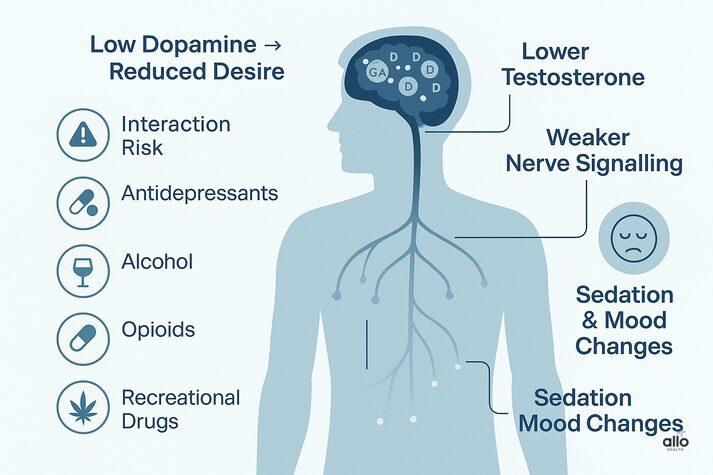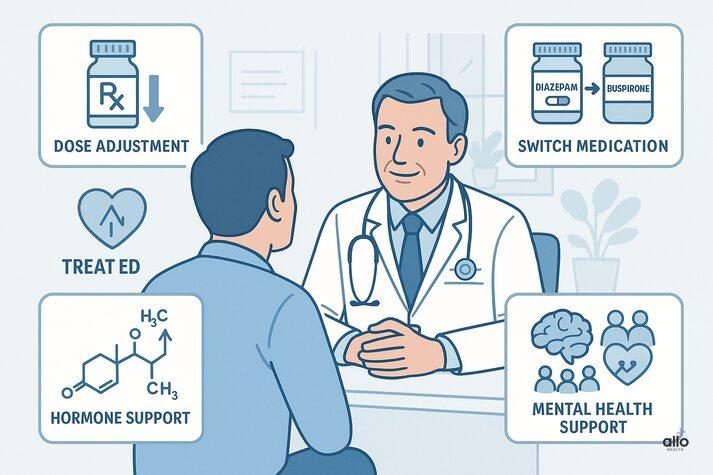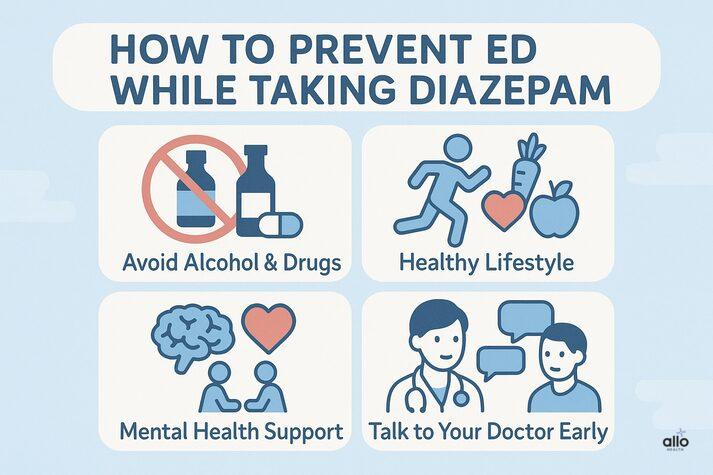Diazepam and Erectile Dysfunction: How Anti-Anxiety Drugs Influence Desire

If you’re wondering whether diazepam can cause erectile dysfunction, the short answer is yes; higher doses and long-term use can affect libido, nerve signaling, and erection quality. The good news is that these side effects are usually temporary and reversible once the dose is adjusted or an alternative medication is chosen. ED can also come from the anxiety or stress you're treating, not just the medication itself. If you're noticing changes in sexual function, don’t stop diazepam suddenly and speak with your doctor so you can safely adjust your treatment and get the right support.
If you’re taking diazepam for anxiety disorders, muscle spasms, panic disorder, or alcohol withdrawal symptoms, and you’ve noticed changes in sexual desire or erection quality, you’re definitely not alone
Diazepam and erectile dysfunction are medically linked, especially at higher or long-term doses. It can affect sexual desire, nerve signalling, and testosterone production, all of which affect erection quality.
In this article, you’ll learn exactly how diazepam affects sexual function, how it compares to other anti-anxiety drugs, and what you can do to improve things if you’re experiencing these changes.
Does Diazepam Cause Erectile Dysfunction?
Yes, diazepam can cause erectile dysfunction. Diazepam belongs to a class of anti-anxiety drugs (psychotropic medications) called benzodiazepines,[1] which are known to affect sexual function in some people. Several studies show:
- Higher benzodiazepine dosages increase the risk of sexual dysfunction, including erectile dysfunction and decreased libido. [2]
- Diazepam combined with other psychotropic drugs (such as antidepressant medications or lithium) significantly raises the likelihood of ED. [3]
- Diazepam impacts the central nervous system, which can interfere with the nerve signals necessary for sexual arousal. [1]
How Does Diazepam Cause Erectile Dysfunction?
Diazepam helps your brain slow down by boosting a natural calming chemical called GABA (gamma-aminobutyric acid). This is why it works well for anxiety and muscle spasms.[1] But because it slows the body’s signals, it can also reduce sexual arousal and make it harder to get or maintain an erection. Let’s look at this in detail:
1. Reduced Sexual Desire
GABA prevents the release of dopamine. Dopamine is a brain chemical essential for sexual desire and sexual arousal. [4]
Low dopamine → reduced libido + weaker erections.
2. Testosterone Disruption
Some studies show that diazepam reduces testosterone, the key sex hormone responsible for sex drive in men, by interfering with the pituitary-gonadal hormones and the StAR gene needed for hormone production. [5]
3. Reduced Nerve Signaling to the Penis
Diazepam is a central nervous system depressant, which means it slows down the central nervous system and the signals that normally help you get an erection. This can reduce nitric oxide release, relax the muscles in the penis less effectively, and lower blood flow, all of which are important for a firm erection. [1]
4. Sedation, Fatigue, and Mood Changes
Diazepam can make you feel tired, less motivated, emotionally flat, or even more anxious about your performance (performance anxiety). All of these feelings can indirectly interfere with your natural sexual response cycle. [2]
5. Interaction with Other Medications
The chances of experiencing sexual side effects go up if you’re taking diazepam along with other medicines or substances like:
- antidepressant drugs
- antipsychotics
- mood-modulating drugs
- recreational drugs or alcohol
- opioids
- street drugs

Is ED Caused by Diazepam Permanent?
No, diazepam-related erectile dysfunction is usually reversible. Research shows that:
- Stopping or reducing benzodiazepines often improves sexual function.
- Recovery time varies from weeks to months, depending on the dose, duration of use, age, underlying mental disorders, co-medications, and general health of the patient.
Is it dose-dependent?
Absolutely. Higher doses → higher risk of sexual dysfunction.
Diazepam vs Other Anti-Anxiety Medications
This table shows how different anxiety medicines compare in terms of ED risk:
| Medication | Sexual Dysfunction Risk |
| SSRIs (e.g., Sertraline) | Very High |
| Diazepam (Valium) | Moderate–High |
| Alprazolam (Xanax) | High |
| Clonazepam (Klonopin) | Moderate |
| Pregabalin / Gabapentin | Low–Moderate |
| Buspirone | Low |
When to See a Doctor
You should talk to a doctor if:
- ED persists for more than a few weeks
- Your sexual desire has suddenly dropped
- You have symptoms of anxiety getting worse
- You’re taking other drugs that might interact
- You have underlying conditions like high blood pressure, endocrine system disorders, diabetes, neurological disorders, or clogged arteries.
- You’re noticing mood changes, depression, or performance anxiety
Diazepam slows the body’s signaling system, which can affect arousal and erections. If that’s happening to you, it’s not your fault; it’s just the way the drug works. And we can absolutely work together to fix it.
How to Manage ED Caused by Diazepam
Never change your dose or stop diazepam on your own, as doing so can lead to withdrawal symptoms and make your anxiety worse. Always speak with your doctor first so any adjustments are done safely and gradually. Some ways to manage side effects are:
1. Lower the Dose
Even a small dose adjustment can reverse sexual dysfunction.
2. Switch to a Medication With Fewer Sexual Side Effects
Buspirone is often used for anxiety with minimal sexual effects.
3. Treat the Underlying ED
You can also treat the underlying erectile dysfunction directly. Options include medications like Viagra or Cialis, or using a penis pump to improve blood flow. Addressing any health conditions that worsen ED can also make a significant difference.”
4. Manage Testosterone Levels
If testosterone is low, treating it through replacement therapy can improve sexual desire and erectile function.
5. Supportive Therapies
Alongside medical care, mental health support can make a big difference. Family counseling, group support, detox centers (if there’s misuse or dependence), and other therapeutic approaches can help you manage stress and anxiety more effectively. And remember, erectile dysfunction isn’t always caused by the medication alone.
Conditions like anxiety, panic disorder, and high stress can reduce sexual desire and affect erection quality on their own. Anxiety can trigger performance anxiety, tighten the muscles, and limit blood flow to the penis. So sometimes the ED is due to the underlying condition you’re treating, which needs to be addressed primarily.

How to Prevent ED While Taking Diazepam
1. Avoid Alcohol and Recreational Drugs
Alcohol, opioids, and street drugs can intensify the sedative effects of diazepam, which increases the chances of sexual side effects.
2. Maintain a Healthy Lifestyle
Regular exercise, a balanced diet, weight management, stress reduction, and quitting smoking all support better blood flow and overall sexual health.
3. Mental Health Support
Psychotherapy for ED, as well as counseling, support groups, or structured programs, can help you manage stress, anxiety, or dependence.
4. Communicate Early
If you notice changes in libido or erection quality, let your doctor know as soon as possible. Early conversations help prevent symptoms from worsening and allow timely adjustments.

Conclusion
Diazepam is an effective medication for anxiety, panic attacks, muscle spasms, seizure activity, and alcohol withdrawal, but it can also affect sexual function in some people. The link between diazepam and erectile dysfunction is well-documented, especially at higher doses or when combined with other psychotropic drugs.
The good news is that these side effects are usually reversible, and with the right adjustments, dose changes, treatment support, lifestyle changes, or switching medications, most people regain normal sexual function. If you’re struggling, don’t hesitate to talk to your doctor. A warm, honest conversation is often the first step toward feeling better physically, emotionally, and sexually.
"The following blog article provides general information and insights on various topics. However, it is important to note that the information presented is not intended as professional advice in any specific field or area. The content of this blog is for general educational and informational purposes only.
Book consultation
The content should not be interpreted as endorsement, recommendation, or guarantee of any product, service, or information mentioned. Readers are solely responsible for the decisions and actions they take based on the information provided in this blog. It is essential to exercise individual judgment, critical thinking, and personal responsibility when applying or implementing any information or suggestions discussed in the blog."






